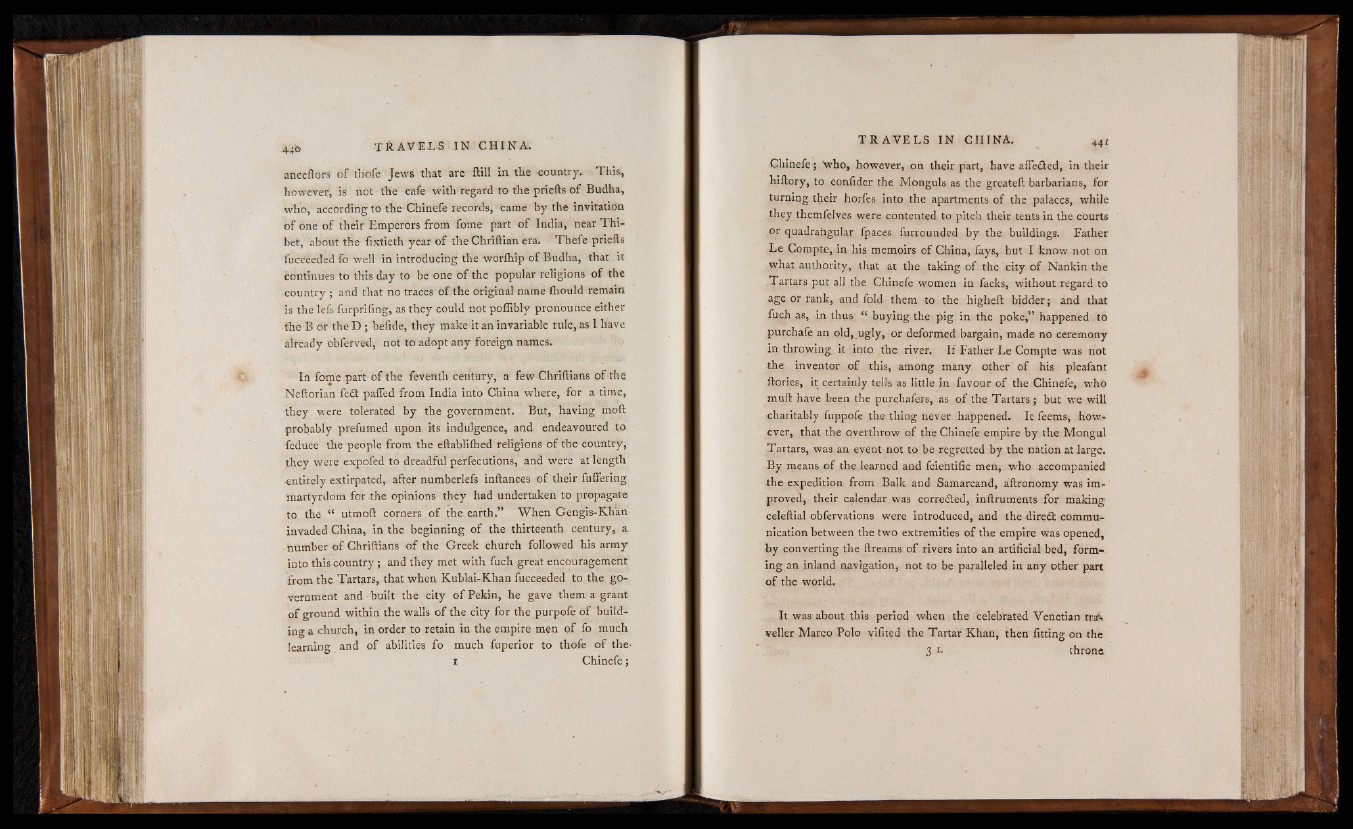
aneeftors o f thofe Jews that are ftill in the country. This,
however, is not the cafe with regard to the priefts o f Budha,
who, according to the Chinefe records, came by the invitation
o f one o f their Emperors from fome part o f India, near T h ibet,
about the fixtieth year o f the Chriftian era. Thefe priefts
fcrcceeded fo well in introducing the worihip o f Budha, that it
continues to this day to be one o f the popular religions o f the
country ; and that no traces o f the original name fhould remain
is the lefs furprifing, as they could not poffibly pronounce either
the B or th eD ; befide, they make it an invariable rule, as I have
already obferved, not to adopt any foreign names.
In fome part o f the ieventh century, a few Ghfiftians o f the
.Neftorian fe£t pafled from India into China where, for a time,
they were tolerated by the government. But, having mod
probably prefumed upon its indulgence, and endeavoured to
feduce the people from the eftabliihed religions o f the country,
they were expofed to dreadful perfecutions, and were at length
entirely extirpated, after numberlefs inftances o f their fullering
martyrdom for the opinions they had undertaken to propagate
to the “ utmoft corners o f the earth.” When Gengis-Khan
invaded China, in the beginning o f the thirteenth century, a
number o f Chriftians o f the Greek church followed his army
into this country ; and they met with fuch great encouragement
from the Tartars, that when Kublai-Khan fucceeded to the government
and built the city o f Pekin, he gave them a grant
o f ground within the walls o f the city for the purpofe o f building
a church, in order to retain in the empire men o f fo much
learning and o f abilities fo much fuperior to thofe o f thei
Chinefe;
Chinefe ; who, however, on their part, have affeâed, in their
hiftory, to confider the Monguls as thé greateft barbarians, for
turning their horfes into the apartments o f the palaces, while
they themfelves were contented to pitch their tents in the courts
or quadrangular fpaces furrounded by the buildings. Father
L e Compte, in his memoirs o f China, fays, but I know not on
what authority, that at the taking o f the city o f Nankin the
.Tartars put all the Chinefe women in facks, without regard to
age or rank, and fold them to the higheft bidder; and that
fuch as, in thus “ buying the pig in the poke,” happened to
purchafe an old, ugly, or deformed bargain, made no ceremony
in throwing it into the river. I f Father Le Compte was not
the inventor o f this, among many other o f his pleafant
ftories, it certainly tells as little in favour o f the Chinefe, who
muft have been the purchafers, as o f the Tartars ; but we will
charitably fuppofe the thing never happened. It feems, however,
that the overthrow o f the Chinefe empire by the Mongul
Tartars, was an event not to be regretted by the nation at large.
B y means o f the learned and fcientific men, who accompanied
the expedition from Balk and Samarcand, aftronomy was improved,
their calendar was corrected, inftruments for making
celeftial obfervations were introduced, and the direét communication
between the two extremities o f the empire was opened,
by converting the ftreams o f rivers into an artificial bed, forming
an inland navigation, not to be paralleled in any other part
o f the world.
It was about this period when the celebrated Venetian trai
veller Marco Polo vifited the Tartar Khan, then fitting on the
3 L throne